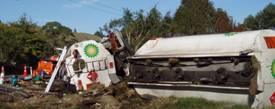5.6 Case study 1:HSNO contract with Department of Labour
Within this section…
Gaps have been identified in compliance, coverage and expertise in the area of ecotoxic and toxic substances since the introduction of the Hazardous Substances and New Organisms (HSNO) Act. In August 2003 the Minister for the Environment secured funding to "stimulate and develop activity and involvement of Regional Councils in HSNO enforcement".
In November 2004 an 18-month trial contract was entered into between the Department of Labour and the NRC to undertake inspections of workplaces storing and using hazardous substances. The contract also requires warranted officers to provide a 24/7 technical advisory service to members of the HSNO Technical Liaison Committee and to attend incidents involving hazardous substances.
Following a successful 18-month trial, a further three-year contract was signed between the Department of Labour and the NRC. Over the past two years the Department of Labour has provided comprehensive training to Council staff. There are presently six warranted HSNO enforcement officers employed by the Council. Two officers are based in Whangarei, with the others located in Kaitaia, Dargaville and Opua.
Workplace inspections
A major priority in the first period of the contract was to educate operators and owners using or storing hazardous substances through visits to their premises, and to increase the level of awareness of the requirements of HSNO.
The first 18 months of the contract involved monitoring businesses storing and using hazardous substances, which highlighted a number of issues, including the following:
· A general lack of knowledge of all aspects of the HSNO Act 1996.
· A lack of suitably qualified Test Certifiers available within the region to certify new and existing Location Test certificates (replacing Dangerous Goods Licences).
· Lack of hazardous substances signage and emergency plans available at sites storing and using hazardous substances.
· Non-compliance with the HSNO Act (mainly due to the lack of Test Certifiers).
During the 2005/2006 financial year approximately 160 sites storing and using hazardous substances were inspected. The types of businesses inspected included service stations, spray painters, gas installers, water treatment plants, timber preservation plants, schools, fertiliser works, rural retailers and retailers selling fireworks.
Incidents
 From December 2004 to December 2006, 66 incidents involving hazardous substances were attended by HSNO enforcement officers. The types of incidents that were attended are shown in table 1 (below).
From December 2004 to December 2006, 66 incidents involving hazardous substances were attended by HSNO enforcement officers. The types of incidents that were attended are shown in table 1 (below).
Table 1: HSNO incidents attended from 1 December 2004 to 31 December 2006.
| Incident type | Number |
| Fires involving hazardous substances | 4 |
| Diesel spills on land | 5 |
| Incidents involving LPG | 7 |
| Incidents involving other gases | 2 |
| Acid spill | 1 |
| Timber treatment chemical spills | 2 |
| Incident involving explosive devices | 1 |
| Petrol spills on land | 2 |
| Incidents at school laboratories | 2 |
| Incidents involving asbestos | 2 |
| Incidents involving hazardous substances at sea | 1 |
| Incidents involving road tankers | 1 |
| Hazardous substances requiring removal for safe storage and disposal | 35 |
| Leaking Storage Tanks | 1 |
| Total | 66 |
